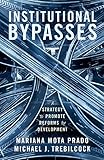Institutional Bypasses : A Strategy to Promote Reforms for Development / Mariana Mota Prado, University of Toronto Faculty of Law; Michael J. Trebilcock, University of Toronto Faculty of Law.
Publisher: Cambridge, United Kingdom ; New York, NY, USA : Cambridge University Press, 2018Description: pages cmContent type:- text
- unmediated
- volume
- 9781108473811 (hardback)
- 9781108462587 (paperback)
- 343.07 PRA 23
- K3820 .P73 2018
- LAW016000
| Item type | Current library | Shelving location | Call number | Status | Date due | Barcode |
|---|---|---|---|---|---|---|
 BOOKs
BOOKs
|
National Law School | General Stacks | 343.07 PRA (Browse shelf(Opens below)) | Available | 38769 |
contents note:
1. Why do we need institutional bypasses?;
2. What is an institutional bypass?;
3. Institutional Bypasses and other reform strategies;
4. Intentional bypasses;
5. Spontaneous bypasses;
6. Conclusion: institutional bypasses and their potential impact on future development efforts.
"Institutional bypass is a reform strategy that creates alternative institutional regimes to give citizens a choice of service provider and create a form of competition between the dominant institution and the institutional bypass. While novel in the academic literature, the concept captures practices already being used in developing countries. In this illuminating book, Mariana Mota Prado and Michael J. Trebilcock explore the strengths and limits of this strategy with detailed case studies, showing how citizen preferences provide a benchmark against which future reform initiatives can be evaluated, and in this way change the dynamics of the reform process. While not a 'silver bullet' to the challenge of institutional reform, institutional bypasses add to the portfolio of strategies to promote development. This work should be read by development researchers, scholars, policymakers, and anyone else seeking options on how to promote change and implement reforms in developing countries around the world"-- Provided by publisher.
"PREFACE: Over the past three decades, a substantial consensus has emerged among development scholars and development agencies that the quality of a country's institutions

There are no comments on this title.